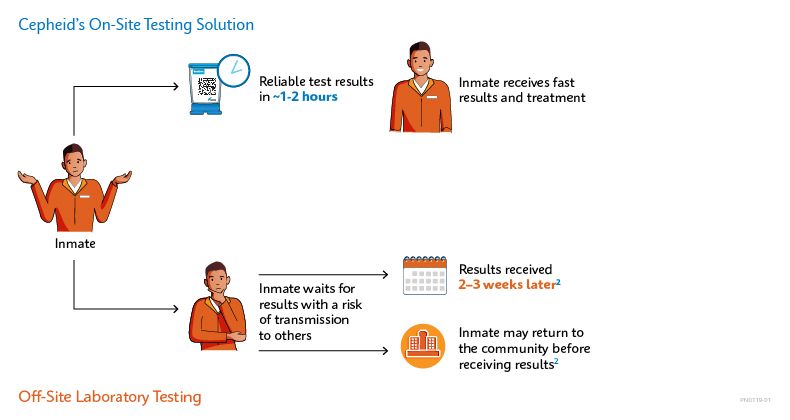2m Read
September 19, 2024
COMMUNITY AND GLOBAL HEALTH
Impact Story
HCV Treatment Drastically Improved by Faster Prison Testing in the U.K.
Treating prisoners who test positive for HCV is a crucial part of the global initiative to eliminate the disease because it helps reduce rates of infection inside and outside prisons.
The current standard pathway for testing, which takes two to three weeks to get the result, is too slow, and many inmates are released from prison before starting treatment.
Providing access to a simplified test-and-treat pathway through point-of-care HCV RNA testing with Xpert® HCV VL Fingerstick provides results in less than an hour.
"The sooner you can get somebody diagnosed and onto treatment, the better it is for that individual and for the community inside and outside the prison.”
Ashley Brown, Consultant Hepatologist at Imperial College Healthcare NHS Trustand HMP Wormwood Scrubs Prison
According to Ashley Brown, Consultant Hepatologist at Imperial College Healthcare NHS Trust and HMP Wormwood Scrubs Prison, implementing the GeneXpert® system as part of the HCV testing pathway enabled the institution to know the status of new inmates in one day instead of two to three weeks.
“It meant 60% more prisoners were able to achieve that treatment period,” Brown notes. “When we follow them up, the vast majority are achieving clearance of the virus, and it is modifying their behaviour, making them less likely to take additional risks."
Using the GeneXpert system at the Wormwood Scrubs prison allowed inmates to find out if they had an HCV active infection on the same day as they were tested. Inmates who test positive begin treatment within four days of being diagnosed, considerably improving the cascade of care and leading to a significant increase in the number of inmates who start treatment.
Watch to learn how point-of-care testing simplifies HCV's diagnostics pathway in prisons.
Prof. Ashley Brown: “The HCV, Hepatitis C Elimination Program is now moving forward.
One of the priorities we have is to tackle HCV in those individuals who are most likely to transmit. Now a really important reservoir of HCV is within the within the prison setting.
We know that many people in prison are there because of drug related crime or drugs are part of their life as well so we know that within the prison we're going to find people with a history of injecting drug use who are going to be HCV positive.
There are two really important reasons why we want to eliminate HCV in prisons. The first obviously is to stop transmission within the prison, still in many countries the provision of needles and syringes within prison is not allowed we know that injecting takes place and therefore new HCV infections are going to arise in the prison.
The other is this circulation of patients we know that people who inject drugs come in and out of prison and while they're in prison it gives us the perfect opportunity to treat their hepatitis c such that as they release back out into the community they're no longer infected. So the principle of treating within prisons is very clear. The practicalities are slightly more different. The major problem we have is that many people admitted to prison because of drug-related crime are there for very short periods of time. Now the traditional pathway of diagnosis testing and treating for hepatitis c is quite a long one, it's a three-step pathway in the first instance we will check for antibodies to hepatitis c virus, for those patients or prisoners who are positive for the antibody, we would then need to do an HCV PCR test in order to confirm the viremia, and then the third step is often genotype in order that we can select the correct treatment for those patients.
What we were finding in my prison was that the majority of prisoners were simply not in prison long enough to go through that traditional pathway so what we needed to do was reinvent the pathway in order to concentrate down the whole-time scale. Now this is where the new diagnostics come in. What we determined was if we could get people diagnosed and started on treatment within 24-48 hours we would be able to treat a far greater number of prisoners during their sentence and furthermore the sooner we start the treatment the less likely they are to transmit to other prisoners during that sentence.
So we designed a new pathway starting off obviously with a point of care antibody test either as a dry blood spot test or more frequently in that high frequency population with an oral fluid swab that would give us an antibody result within a few minutes. We then moved on to the Xpert® HCV VL Fingerstick which would enable us to determine those patients who were viremic within another hour, so already we've concertinaed what would have been probably two three weeks treatment testing into a simple couple of hours.
With the addition of pan genotypic short duration directly acting antiviral drugs we were able to start those patients immediately on treatment we didn't have a genotype it didn't matter but what we know then is that those patients would be a-viaremic within a matter of days and therefore onward transmission was going to be reduced and also 60 percent more prisoners would be able to achieve that treatment period whilst they were still with us.
And we know from looking at the results we're now getting many, many more prisoners onto treatment immediately when we follow those prisoners up, the vast majority of them are achieving their SVR, the clearance of the virus and we're also seeing actually how it's modifying behavior that they're much less likely to take additional risks because they're they feel better having eliminated their virus and they can then pass that message on to other prisoners and to other drug users within the community encouraging them to come forward for testing and treatment.
So in conclusion what we've shown is that time matters--it's really important the sooner you can get somebody diagnosed and on to treatment the better it is for that individual the better it is for the community and the closer it brings us to HCV elimination.
And the Xpert® HCV VL Fingerstick test really is a very important part in concerting down that pathway and helping us all to achieve HCV elimination.”

Cepheid’s testing solution provides medically actionable information to healthcare professionals, enabling same-day testing and treatments for infectious disease management.
Learn more about the GeneXpert® system.
CE-IVD. In Vitro Diagnostic Medical Device. May not be available in all countries. Not available in the United States.
References:
Z.Mohamed, et al. Time matters: Point of care screening and streamlined linkage to care dramatically improves hepatitis C treatment uptake in prisoners in England. Int J Drug Policy. 2020 Jan;75:102608. https://pubmed.ncbi.nlm.nih.gov/31759307/
Point-of-Care Testing Simplifies the Diagnostics Pathway for Hepatitis C in Prisons. Video accessed May 24, 2024. https://youtu.be/eiZiHNeJn7g
Read Next
MORE







